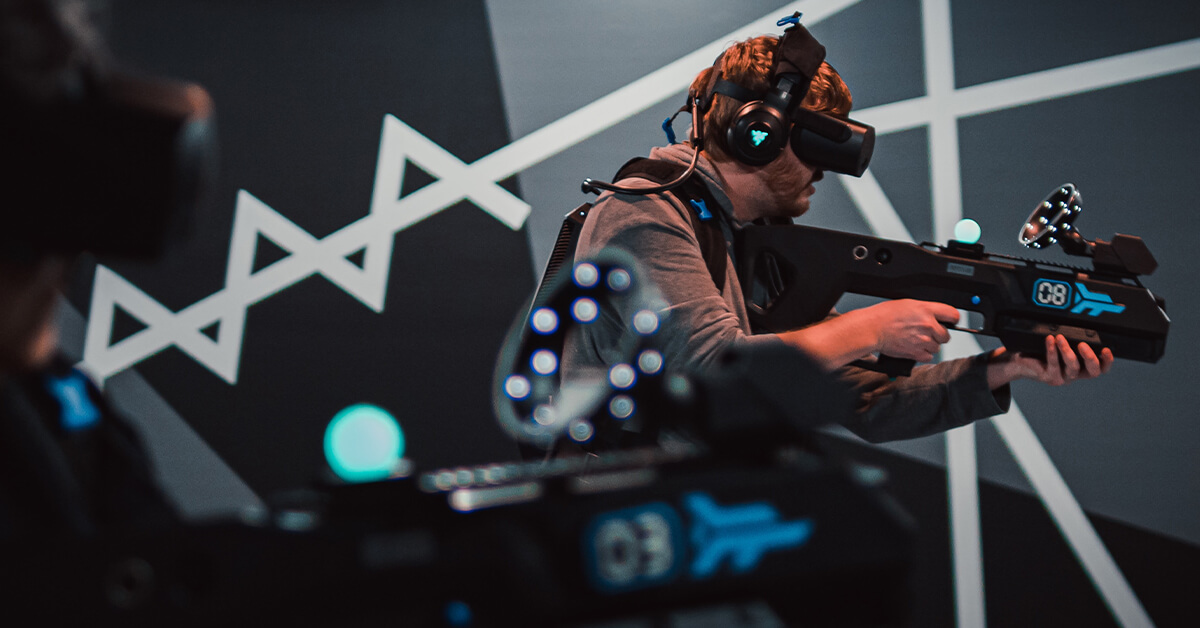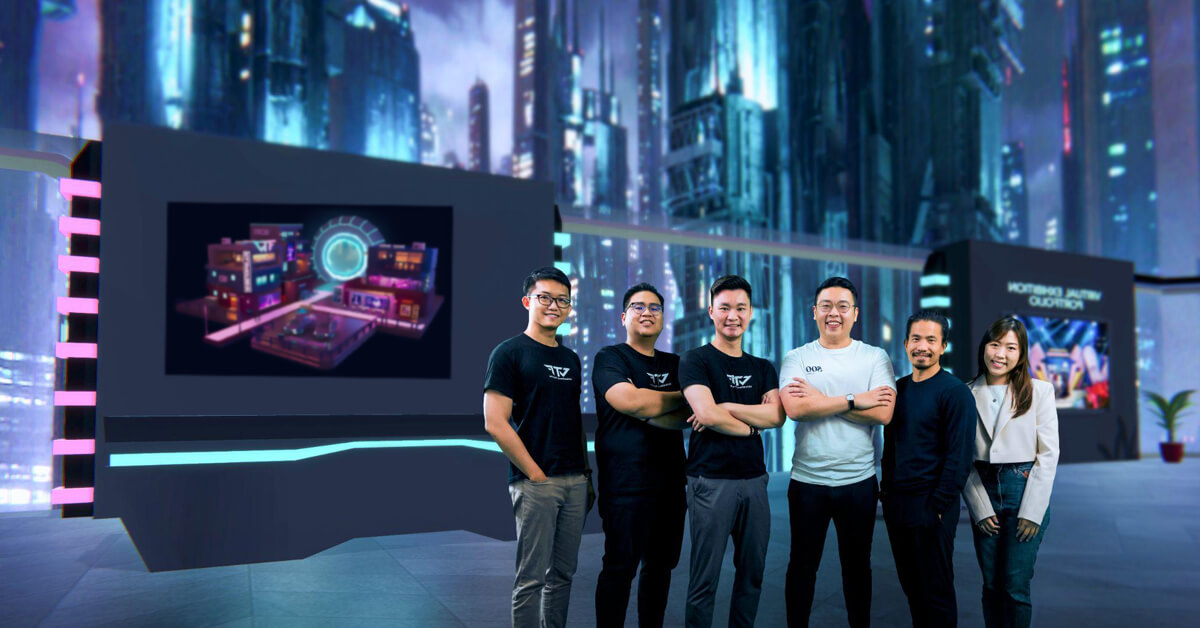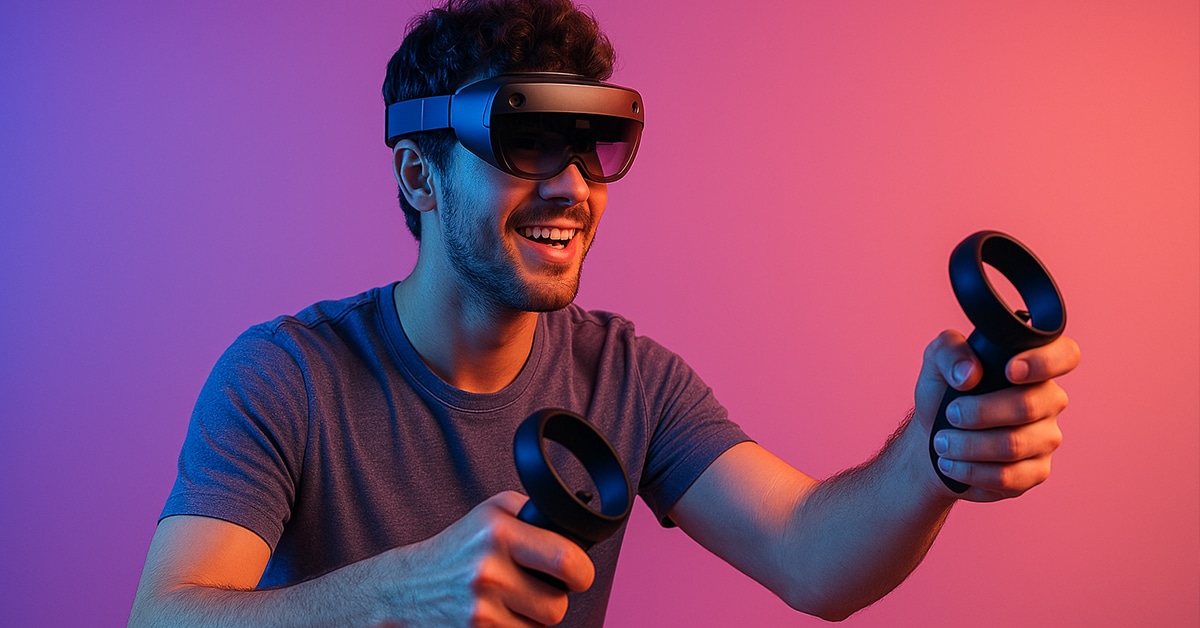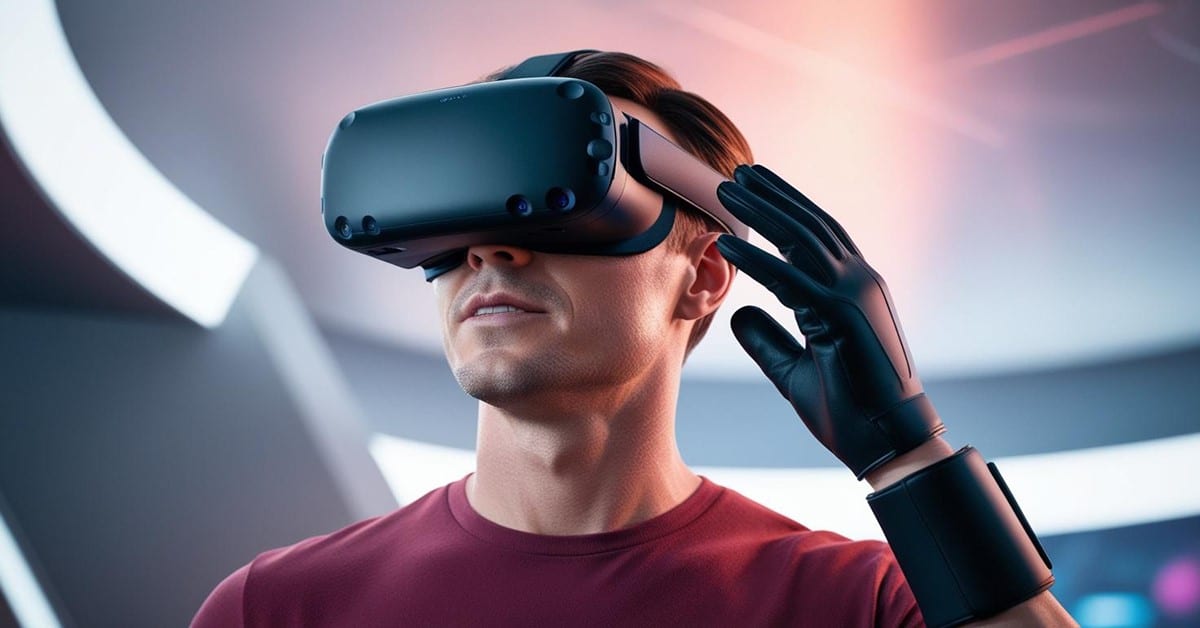Virtual reality in the gaming industry is changing the video game landscape. The leap from 2D to 3D graphics ushered in a heightened level of realism. But VR is taking that 3D concept and putting the players themselves in the midst of it. Read on to discover where VR gaming is now and where it’ll be in the near future.
Quick Menu:
- The Metaverse Is a Foundational Element of Virtual Reality in the Gaming Industry
- What Is Virtual Reality?
- What Is the Difference Between Virtual Reality, Mixed Reality, Augmented Reality, and Extended Reality?
- What Is the Gaming Industry?
- What Is VR Gaming?
- Virtual Reality in the Gaming Industry: Biggest Players
- The Intersection of Consumer VR Hardware and Virtual Reality in the Gaming Industry
- Some of the Biggest Virtual Reality Games
- Virtual Reality in the Gaming Industry Is One Piece of a Larger Puzzle
The Metaverse Is a Foundational Element of Virtual Reality in the Gaming Industry
Virtual reality in the gaming industry incorporates many elements, but the metaverse is fundamental. You can think of the metaverse as a bridge or merger between two worlds. It acts as a boundless collaboration between the online and physical world that’s created through new technologies and applications. The underlying metaverse meaning is also highly social. It’s a persistent world that you can enjoy with others while leaving lasting changes within it.
Metaverse devices like VR headsets can fully immerse you in various metaverse virtual worlds and settings. But other metaverse devices can bring elements of the virtual world into the physical one. Everything from headsets to game consoles and even phones offers its own unique spin on the metaverse. The article “Metaverse Guide; Understanding The Basics Will Open Up a New World” will provide you with everything you need to know to get started with the metaverse.
What Is Virtual Reality?
Virtual reality in the gaming industry also has another critical component – virtual reality. Virtual reality (VR) describes technologies that immerse users in a computer-generated virtual environment. This is typically done through a special VR headset. The headset uses internal screens, speakers, and more to create realistic worlds. It can display amazing landscapes, educate people on subjects as in-depth as heart surgery, and put you right into video games as if you were one of the characters.
Virtual reality might seem inherently futuristic. But people have been working toward this technology since at least the 1950s. That era marked the debut of a special movie theater system called the Sensorama. A Sensorama system helped immerse moviegoers with sensory experiences like smells and vibrations. You can learn about VR and the Metaverse companies working with it in the article “Virtual Reality; Discover VR, Its Components, Technology, and Players.”
What Is the Difference Between Virtual Reality, Mixed Reality, Augmented Reality, and Extended Reality?
It’s also important to remember that not everything related to the metaverse is necessarily a part of virtual reality in the gaming industry. VR is one component of extended reality (XR). XR also encompasses augmented reality (AR) and mixed reality (MR). AR enhances or augments the perception of the physical world. It typically overlays digital displays, such as artificial objects or text, over the physical world. In comparison, VR substitutes digital reality for the physical. MR sits between the extremes. It merges the physical and virtual through projections, like holograms.
You can learn about augmented reality technologies in the article “Augmented Reality; Learn About AR Tech, Use Cases, Devices, and More!”. And the article “Mixed Reality; Everything to Know About MR Technologies” is the perfect introduction to mixed reality. Finally, you can see the overall impact of XR in the article “Extended Reality; How is XR Changing the Digital World?”.
What Is the Gaming Industry?
When looking at virtual reality in the gaming industry, it’s also essential to define what’s actually meant by the term gaming industry. It’s not just about games; it’s also about technology. The gaming industry is one of the most innovative areas of the tech sector, and it’s arguably among the most influential. Gaming companies constantly push hardware to the next level to create new consoles and gaming accessories. The modern gaming industry also encompasses esports and streaming entertainment like Twitch and Mixer. The larger industry isn’t just about video games. It’s about creating immersive entertainment experiences in multiple mediums.
What Is VR Gaming?
A few decades back, virtual reality in the gaming industry was just a dream. Gamers saw the leap from 2D to 3D and knew that VR was on the horizon. And gamers can now turn their homes into a VR wonderland thanks to a new generation of affordable hardware. VR headsets can take standard 3D engines and create a fully immersive world, which doesn’t just use 3D graphics but actual 3D environments that feel like a true virtual reality.
Gamers can load up a metaverse avatar and immerse themselves in fantastical adventures. Virtual reality gaming even makes it easy to join other players in social environments and action-packed gaming sessions. Gamers can crouch, jump, and even run while their equipment translates it all into virtual reality. This is partly thanks to constant improvements in AI, which can help transmit information between different mediums.
Virtual Reality in the Gaming Industry: Biggest Players
VR, in general, is full of amazing companies creating various innovative products. But some companies deserve special attention, even among the tech giants. The following are among the most significant players in virtual reality in the gaming industry.
NVIDIA
NVIDIA contributes to most areas of virtual reality in the gaming industry. It produces the infrastructure for both advanced AI and 3D graphics. In addition to that, you’ll find NVIDIA products powering professional visualization, automotive markets, and data centers. Its GPUs are used for edge-to-cloud computing, AI, home PCs, and even supercomputers. On top of that, NVIDIA has created a line of handheld gaming consoles under the Shield brand. This includes the Shield TV, Tablet, and Portable. It also provides a GeForce Now cloud gaming service and Shield TV. NVIDIA works with almost every technology related to VR in gaming.
Video: The future of graphics powered by GeForce RTX 40 Series
Unity
People often focus on hardware like VR headsets when talking about VR. But the software is just as essential. And Unity is an industry leader in cross-platform 3D engines. Unity was created by Unity Technologies and first released in 2005 as an engine for OS X games. Unity’s scope would grow over time and eventually extend to a wide variety of systems. This includes desktop as well as mobile platforms. But it’s also a popular option for virtual reality in the gaming industry. It’s so popular that Fortune has stated that Unity “dominates the virtual reality business.”
Video: Unity and PlayStation®VR2
Meta & Oculus
No discussion of VR would be complete without mentioning Meta. Formally known as Facebook, Meta has become one of the driving forces behind both virtual reality in the gaming industry and VR. Meta’s metaverse development primarily comes through two different avenues – hardware and software. It’s created both powerful VR headsets and the metaverse worlds they access. The article “Meta Metaverse; All the Ways Meta Is Building the Metaverse” will get you started with Meta’s metaverse. And you can delve into the company’s latest VR hardware in the article “Meta Quest Pro; Meta’s Project Cambria Finally Released!”
Video: Introducing Meta Quest Pro
HTC
HTC, or High Tech Computer Corporation, originally began as both an original equipment manufacturer (OEM) and an original design manufacturer (ODM). HTC would create computers and laptops while serving in this capacity. But over time, HTC would expand into innovative new realms – including VR. This would culminate in products like HTC’s Vive Focus and Vive Pro. The Focus, in particular, is notable as an “all-in-one” headset. HTC has also created several VR accessories, many related to virtual reality in the gaming industry. This includes controllers, base stations, and adapters. It’s even released an entire Viverse metaverse ecosystem.
Video: VIVE XR Elite
Qualcomm
Qualcomm is an established industry leader in telecommunications equipment, the CDMA digital service platform, and semiconductors. But it’s also been able to leverage that expertise to become one of the leading voices of virtual reality in the gaming industry. One of its most important VR contributions is the Snapdragon XR platform. This VR powerhouse lets people travel through vivid landscapes while interacting with lifelike avatars representing other users. And the platform builds on success with features such as 5G, edge cloud processing, and even AI. The combination of cloud and on-device processing produces experiences that almost feel real.
Video: Snapdragon in 5
The Intersection of Consumer VR Hardware and Virtual Reality in the Gaming Industry
People new to VR might be surprised by how many options are available. Virtual reality in the gaming industry is a relatively recent phenomenon compared to PC gaming and consoles. But metaverse brands have created a wide range of VR products suitable for gaming. VR headsets are the most obvious. But there are almost always options to take things to the next level. For example, the VR controllers used with headsets can offer several unique options. You can even go with recreations of physical items, such as a VR-based gun.
Even movement can be augmented through the use of VR treadmills. And don’t forget, VR gear also opens up options to work with metaverse elements like NFT and the blockchain. Discover everything you need to find the perfect VR hardware in the article “VR Headsets; Your Complete Guide to the Top Virtual Reality Gear.”
Some of the Biggest Virtual Reality Games
Virtual reality in the gaming industry is already responsible for a wide variety of amazing products. But some games deserve special appreciation for their success. Each of the following games has brought something truly remarkable to the gaming public.
Half-Life: Alyx
Many people consider Half-Life: Alyx to be the first true killer app for virtual reality in the gaming industry. It serves as a prequel to 2004’s massively popular Half-Life 2. Players take on the role of Alyx Vance to track down an alien superweapon. The game’s VR system adds new fun to the idea by introducing “gravity gloves” to Alyx’s arsenal. This lets players grab items from a distance and fully immerse themselves in the 3D environment. The game was a huge hit among general gamers and Half-Life fans and won “Best VR/AR” at the 2020 Game Awards.
Video: Half-Life: Alyx Announcement Trailer
Beat Saber
Beat Saber is a Czech game developer Beat Games contribution to the world of rhythm games. Virtual reality in the gaming industry covers almost every genre. But there’s no doubt that Beat Saber is among the top options for anyone who likes combining physical movement, engaging music, and surrealistic neon environments. Players are presented with a combination of all of those elements as blocks appear before them in VR. And those elements are all synced to the music’s beat. Players need to use a pair of contrastingly colored sabers, a representation of the VR controllers, to slice through the blocks.
Video: Beat Saber
Phasmophobia
Almost everyone loves a good ghost story, and virtual reality in the gaming industry has proof of that fact in the smash hit Phasmophobia. The game can be played alone or in groups of up to four people. Each player is presented with a first-person view of a haunted location. They’ll need to complete a contract by investigating a haunted location while discovering the type of ghost in that area. The indie game studio Kinetic Games released the game with some spectacular reviews. For example, CBR described it as “the perfect game for the Halloween season” while praising its atmosphere.
Video: Phasmophobia – Official Announcement Trailer
The Walking Dead: Saints & Sinners
The Walking Dead: Saints & Sinners provides players with something groundbreaking. It’s a 2020 release from Skydance Interactive, which puts you in the shoes of a survivor during a zombie apocalypse. The player can wander through the tattered remains of civilization in a way that only virtual reality in the gaming industry could provide. The game’s VR nature means that you can really feel immersed in the scenery as you trek through the remains of New Orleans. And during those treks, you’ll also feel the thrill of knowing that you might need to wrestle with zombie hordes at any time.
Video: The Walking Dead: Saints & Sinners | Announce Trailer
Superhot
Superhot gained a lot of attention when it was released in 2016. The game is a perfect example of how virtual reality can produce truly unique experiences in the gaming industry. The game felt like a shot of pure adrenaline and made great use of the Rift’s Touch controllers. But everything great about the game was pushed to the next level in 2019 when the Quest’s wireless capacity became a part of the experience. Because time only moves in the game when you do, every weapon used and every attack dodged comes with a unique feeling of immersion and satisfaction.
Video: SUPERHOT VR Release Trailer
Virtual Reality in the Gaming Industry Is One Piece of a Larger Puzzle
Virtual reality in the gaming industry is impressive enough. But most industries have seen similar growth and similar expectations for the future. Metaverse news often highlights how metaverse crypto is being used to change how companies do business. And the larger NFT meaning highlights the fact that any business can now create unique digital assets for use in VR. Healthcare is using VR to teach surgeons, construction to plan projects, education to engage students fully, and much more. You can discover more compelling examples in the article “Virtual Reality Industries; An Overview of All Sectors Using VR.”
VR might seem intimidating at first. But as you’ve seen, virtual reality in the gaming industry is fun, affordable, and brimming with innovation. Even better, it’s extremely easy to jump into, no matter what kind of experience you’re looking for.
Did You Like This Article About Virtual Reality in the Gaming Industry?
You might also be interested in the following articles:
- AI Marketing; Take Advantage of Artificial Intelligence Strategies
- Metaverse Token; 10 Most Popular Metaverse Tokens Right Now
- Metaverse News; The Top 10 News Resources You Must Follow









Leave A Comment